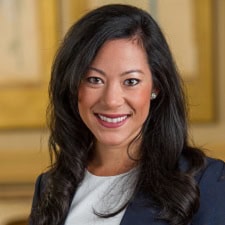
May Davis
2015 John Marshall Fellow
What is your current position?
I am a Special Assistant to the President and an Associate White House Staff Secretary.
What inspired you to choose this career path?
As with many things in life, I ended up here less by choice and more by happenstance. I was practicing as a private attorney in Denver, when I received a phone call from a law school classmate who served on the Federalist Society board with me. He asked whether I would be interested in working in the White House. The Staff Secretary’s office appealed to me because, while it is a behind-the-scenes role, it engages with every component and every issue in the White House. This role as a generalist was what interested me in becoming an attorney. I am perpetually learning and constantly being challenged, which makes for a very fulfilling life.
What are you currently working on?
So many different things! The priorities of the President dictate my daily priorities. The news cycle, which can turn on a dime, also influences my day. At any given moment I could be juggling work on tax reform and trade policy, an executive order on infrastructure, a Presidential proclamation declaring Patriot Day, and a press release on national monuments. The Staff Secretary’s office acts as the policy coordination hub, so I spend much of my day managing the information and decision flow into and out of the Oval Office.
There’s never a dull moment but it also obviously requires a lot of long hours each day. Fortunately, I work with a great group of people, led by Rob Porter, the White House Staff Secretary.
How did you hear about the Claremont Institute?
Luckily, I had the fortune of meeting a strong line of Claremont Institute alumni in law school.
What’s your fondest memory of the Claremont Institute?
Obviously, the field trip to the shooting range! Beyond that, I most fondly remember a conversation with three fellowship friends, recapping the discussions of the day, while sitting on a beautiful beach during sunset. These post-lecture discussions are the best part of the Fellowship because they helped us think critically about the lectures, and they cement friendships that have lasted well beyond the Fellowship.
There are all sorts of educational programs out there for current and rising conservative professionals. What do you think makes the Claremont Institute’s Fellowships unique?
The John Marshall Fellowship is unique because very few conservative legal organizations focus on natural rights. The Fellowship provides an unparalleled opportunity to grasp the legal significance of natural rights at the beginning of your career. Some law schools teach conservative legal doctrines, such as law and economics or textualism, and some students come into law school with a religious or policy understanding of natural rights. The John Marshall Fellowship fills in the legal gap.
If you could have a drink with an American Founder, or any great thinker, who would it be, why, and what would you order?
As a lawyer, I would love the opportunity to speak with both James Madison and Alexander Hamilton. I would do my best to bring them up to speed on how their constitutional framework has functioned since 1789 and then gauge their reactions to how their political experiment has developed. I would be particularly interested to see the extent to which Madison and Hamilton would have similar views on the state of contemporary American politics. As for the drink of choice, when hanging out with Madison and Hamilton, I’d have to order an Old Fashioned.
Who was more important for their time, George Washington or Abraham Lincoln? Why?
While this is an impossible choice, and while I think it is fair to say that Lincoln’s intellectual contributions to American political life were greater than Washington’s, in terms of sheer importance, I don’t see how Washington can be surpassed. He is the rightful model for American statesmen, and his above-the-fray leadership saw our country through its birth and earliest days, setting precedents that carry forward today. The free Nation and democratic political structure his leadership created gave Lincoln something worth fighting for.
What is the greatest challenge facing the United States today?
I think maintaining American competitiveness in the global economy continues to be a great challenge. Fortunately, President Trump has the skillset and determination to meet this challenge, and I know he is committed to ensuring that our government once again values and supports American workers and entrepreneurs.
What books are you reading right now?
I just finished The Gatekeepers: How the White House Chiefs of Staff Define Every Presidency, by Chris Whipple. I knew little about the White House structure before starting, and it’s fascinating how a small group human beings can shape the course of our country.
You’re from Kansas, how are you feeling about the Kansas City Chiefs’ season?
I am a huge football fan, and my two favorite teams are actually the Denver Broncos and the Kansas City Chiefs, as I spent my childhood in both Denver and Kansas. Unfortunately, I haven’t been able to follow this season as closely as I would like, but let’s just say that I am excited about the possibility that the Chiefs might be visiting my place of employment sometime in Spring 2018!

